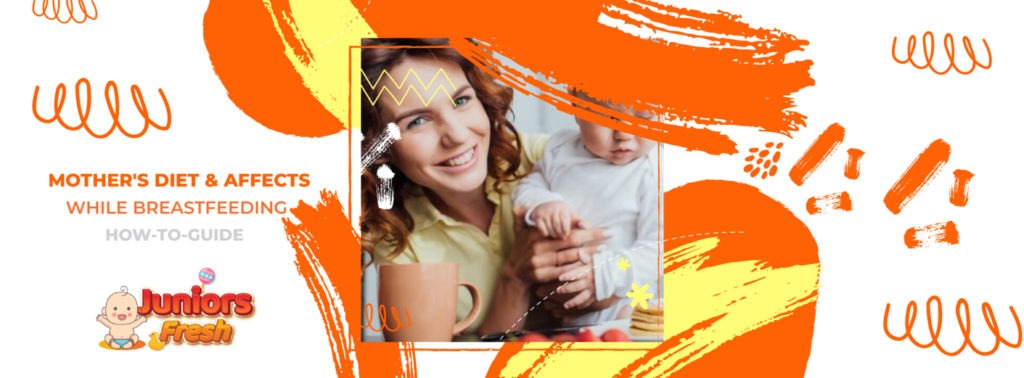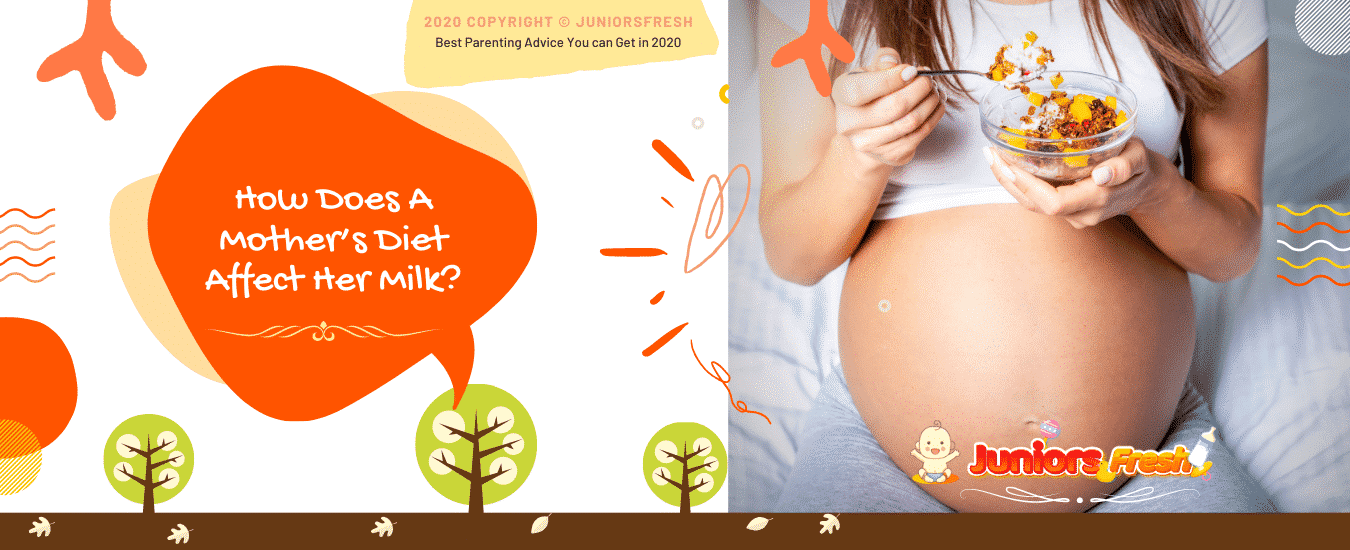How Does a Mother’s Diet Affect Her Milk?
Introduction
It has always been advised that every breastfeeding mother should have a healthy and balanced diet. One might want to ask “why” or want to know the reason behind this statement. The reason is simply this; whatever you eat helps to maintain and keep you balanced and fit and not necessarily to produce breast milk for your baby.
As much as these food substances may serve as a raw material for milk production, breast milk production is not directly dependent on them. Infants do not feed on any other kind of foods except breast milk; therefore, it should contain a totality of every nutrient needed for the growth and development of the child.
The raw materials for breast milk production are naturally provided by the body system, making food and other supplements eaten or consumed by the mother a secondary raw material.
For instance, fat intake in the form of food substances doesn’t affect the quantity of fat present in breast milk; it only affects the mother’s milk’s fat type. For example, according to a study, mothers who eat traditional maize diets contain lower amounts of monounsaturated fatty acid in their milk compared to urban mothers who eat more animal proteins and fats.
Studies have shown that the fullness of the breast is the driving factor of fat content in breast milk, which implies that a less-fuller breast comes with a higher content of fat and it is the opposite when it comes to the fuller breast. The breast milk’s volume produced goes in line with the growth of the babies in fully breastfeeding babies.
There is, therefore, no list of food to avoid because what affects a particular child (allergic foods) may not affect another. Also, if your baby generally reacts to what you eat, then it is not just the food, although certain symptoms show if your baby is reacting to what you eat. These symptoms include spitting up, vomiting, rashes, sneezing, dry skin, nausea, sneezing, etc.
What Food Should I Eat as a Breastfeeding Mother?
Breastfeeding mothers wonder if the food they eat affects their breast milk formation. Some even wonder about the necessity to avoid certain food to prevent allergies or digestive problems and even more in your baby. Others may wonder if there are special kinds of food that one will eat to make the right amount and the best quality of milk for your baby.
Breast milk isn’t formed by what the breastfeeding mother eats but what goes into their bloodstream. In as much as the body knows how to convert your food materials to the needed breast milk, your baby needs at different stages of their lives regardless of what you eat, yet there is a need also to eat right and healthy.
Here is a List of What a Breastfeeding Mother Can Eat:
- Protein food such as meat, eggs, fish (such as salmon, bluefish, which boost the DocosaHexaenoic acid in your milk for brain development of your child), beans, dairy, nuts, and seeds for 2-3 times per day.
- Vegetables such as dark green (pumpkin leaves, green beans, green peas, okra, etc.) and yellow vegetables at least three times a day.
- Carbohydrates such as cereals, pasta, wheat bread, and grains like oatmeal, millets, maize, etc., should be included in your daily diet.
- Fruits should also be included in your daily diet.
- Water: Drinking enough water is also of great importance. Water should not be replaced with any fluid such as soft drinks or even alcohol. Water helps to balance the body’s metabolic processes and keep the body hydrated.
What Food Should I Avoid as a Breastfeeding Mother?
It was earlier stated that the type of food a nursing mother eats or takes in does not determine how her breast milk flows. You should not have to abstain from foods except if your baby is allergic to it, else eat what you want and at any quantity, you need it.
This is because breast milk is produced by what passes into the bloodstream of the mother and not what goes into the digestive tract (although there are some exceptions).
Having this in mind, one must also note that certain intervals or periods where a nursing mother can take in certain food materials will harm both her and her baby. Therefore, as much as breastfeeding mothers can eat what they want, they should also know the necessity to keep off or eat.
Here are some unhealthy food types that most of us, including breastfeeding mothers, must avoid or reduce intake:
- Fishes With High Mercury Content: Fishes such as swordfish, tilefish, king mackerel, sharks, and feed on other fishes and, as such, may contain mercury in high amounts. These fishes, when eaten, cause gastrointestinal problems and other health issues.
- Alcohol: Recent studies have shown that taking alcohol (1 or 2 bottles) occasionally will not harm babies. To minimize the alcohol content in the breastmilk and not endanger the immature liver of infants, breastfeeding should be done a few hours after drinking. Alcohol does not stay in your milk; it is removed as your blood alcohol level goes down; the 2-3 hours of waiting is of great essence and necessity.
- Caffeine: It is great when it is taken in moderate quantity. Infants are very sensitive to caffeine, and when taken in excess causes an effect on the baby. Therefore caffeine should be taken when your baby is quiet older.
- Peanuts and Cow Milk: These substances end up in breast milk and can pose a problem if babies are allergic to them. Allergies may be hereditary; therefore, it is necessary to look out for those allergic foods in the family and keep them away from them.
- Food that Brings About a Bad Reaction in Babies: If you notice your baby is reacting to food you should try to cut down the intake of that particular food and watch if symptoms improve before eating it again. If symptoms continue, then consider eliminating them.

What Do I Need to Maintain My Milk Supply?
Knowing that food taken into the system does not directly affect breast milk supply or production unless it narrows into the bloodstream, one might begin to ponder or worry over what to do or how to maintain breast milk supply for their babies. The following are the ways this can be achieved.
- Often, and Effective Baby Nursing: This is the most important factor responsible for maintaining ample milk supply. The more often and effective your baby latches, the more milk produced. This is because the body (breasts) is structured to keep producing milk so long as your baby continues drinking it.
- Heavy Dieting and Little Water Intake: heavy dieting results in producing too many calories, which reduces breast milk supply. Therefore, breastfeeding mothers should eat to their appetite (sensible dieting) and listen to their body system. Drinking little or even too much water is not recommended for nursing mothers.
Drinking excessive fluids does not help since it has no effect on milk supply and may even cause discomfort. Therefore the watchword of nursing mothers as regards feeding and drinking is “Eat when you’re hungry and drink when you’re thirsty.”
Certain things that can affect breast milk production in breastfeeding mothers having known that food and other substances listed above cannot affect the breast milk production of a nursing mother, knowing and answering the question “What Can Affect Breast Milk Production” is now a very cumbersome question to answer.
Therefore here are certain factors that can affect breast milk production in mothers.
- Herbs and Spices: Some particular herbs can cause the reduction of breast milk supply. They include thyme, peppermint, parsley and lemon balm.
- Medications: Cold medication such as those that contain Pseudoephedrine (example: Sudafed) can affect and as well reduce milk production amongst breastfeeding mothers.
- Formula Feeding: if you feed your baby with more formula often, it practically tells your breast to slow down or reduce the production of milk. Therefore nursing more increases production.
- Cigarette Smoking: A breastfeeding mother who smokes indirectly reduces her milk production and as well risks the health of both her and her baby.
- Birth Control: Different birth control pills can slow down or reduce breast milk production. A birth control pills that contain only progestin-only is best since there is no adverse effect.

